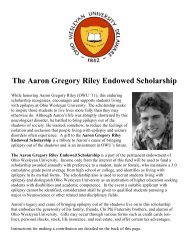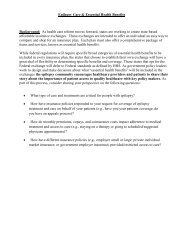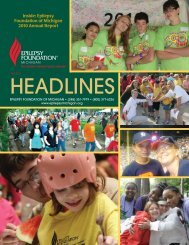Legal Rights of Children with Epilepsy in School & Child Care
Legal Rights of Children with Epilepsy in School & Child Care
Legal Rights of Children with Epilepsy in School & Child Care
You also want an ePaper? Increase the reach of your titles
YUMPU automatically turns print PDFs into web optimized ePapers that Google loves.
Dispute Resolution and <strong>Legal</strong> Remedies<br />
Witte v. Clark, 197 F.3d 1271 (9 th Cir. 1999)<br />
Damages are not available under the IDEA; exhaustion <strong>of</strong> IDEA adm<strong>in</strong>istrative remedies<br />
is not necessary.<br />
Cov<strong>in</strong>gton v. Knox County <strong>School</strong> System, 205 F.3d 912 (6 th Cir. 2000)<br />
A claim for money damages does not create an automatic exception to the IDEA’s<br />
exhaustion requirement, but <strong>in</strong> the case at hand, money damages, which were the only<br />
remedy that could redress pla<strong>in</strong>tiff’s <strong>in</strong>juries, were not available <strong>in</strong> the adm<strong>in</strong>istrative<br />
process and exhaustion would have been futile.<br />
Padilla v. <strong>School</strong> District No. 1, City and County <strong>of</strong> Denver, Colorado, 233 F.3d 1268<br />
(10 th Cir. 2000)<br />
The court did not address whether the IDEA permits damage awards <strong>in</strong> this case, which<br />
<strong>in</strong>volved a child whose <strong>in</strong>juries dur<strong>in</strong>g a restra<strong>in</strong>t <strong>in</strong>cident exacerbated her seizure<br />
disorder; the court found that exhaustion <strong>of</strong> adm<strong>in</strong>istrative remedies was unnecessary<br />
because the relief she sought was unavailable <strong>in</strong> the IDEA’s adm<strong>in</strong>istrative remedy<br />
process.<br />
Polera v. Board <strong>of</strong> Educ. <strong>of</strong> Newburgh Enlarged City <strong>School</strong> District, 288 F.3d 478 (2d<br />
Cir. 2002)<br />
The court held that damages are not available under the IDEA, but pla<strong>in</strong>tiffs cannot avoid<br />
the IDEA’s exhaustion requirement simply because they seek relief that is not available<br />
under the IDEA. But earlier precedent allow<strong>in</strong>g damages pursuant to a Section 1983<br />
claim for denial <strong>of</strong> access to adm<strong>in</strong>istrative remedies under the IDEA’s predecessor<br />
statute rema<strong>in</strong>s valid law, and district courts <strong>with</strong><strong>in</strong> the circuit have relied on the decision<br />
to hold that damages are available on claims brought under Section 1983 for violations <strong>of</strong><br />
the IDEA. See Quackenbush v. Johnson City Sch. Dist., 716 F.2d 141, 148 (2d Cir. 1983),<br />
cert. denied 465 U.S. 1071 (1984).<br />
Nieves-Marquez v. Commonwealth <strong>of</strong> Puerto Rico, 353 F.3d 108 (1 st Cir. 2003)<br />
Money damages are not available under the IDEA, but the court left open the possibility<br />
<strong>of</strong> damages under Section 504 or the ADA for <strong>in</strong>tentional conduct caus<strong>in</strong>g harm and<br />
possibly, but not clearly, for other claims.<br />
Barnes v. Gorman, 536 U.S. 181 (2002)<br />
Punitive damages are not available under Title II <strong>of</strong> the ADA or under Section 504.<br />
125








